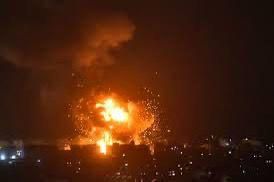Israel carries out massive attack in Beirut, sending a message to Hezbollah and Trump
On the eve of the Eid al-Adha holiday, Israel launched one of its most impressive attacks. Aoun tried in vain to stop the military operation while Israel’s Defence Minister issued new threats. Hezbollah is using Iranian-style "slow diplomacy". Impatience is growing in Israel over US policies in the region.
Beirut (AsiaNews) – This is one of the largest waves of attacks carried out by Israel since 27 November 2023. Yesterday evening, the eve of the major Muslim holiday of Eid al-Adha, the Jewish state launched a series of strikes against Beirut’s southern suburbs, targeting no fewer than four neighbourhoods and forcing residents to scram for safety. The stated targets were buildings whose basements are used to manufacture and store drones.
Fortunately, the Israeli army had previously called for the evacuation of the affected neighbourhoods. Lebanese President Joseph Aoun reached out to numerous contacts to prevent the strikes, stating that the Lebanese army would take over the five buildings designated as targets by the Israeli army spokesperson, but he met with a firm refusal.
Israeli Defence Minister Israel Katz justified these strikes by stating that, “Agreements must be respected, and if you don't do what's required – we will continue to act with great force.”
The Lebanese president responded saying that these raids constituted indiscriminate attacks against all of Lebanon. Lebanese Prime Minister Nawaf Salam called them a flagrant violation of Lebanese sovereignty and a breach of Resolution 1701.
Lebanon fears that these developments could harm a promising tourist season. Surrealistically, however, Thursday's raids did not disrupt air traffic at Beirut International Airport.
A clear and direct message
Israel’s escalation sends a "clear and direct message" to the Lebanese government, some observers note, over the slow pace of disarming Hezbollah. It also comes the day after a missile attack from southern Syria toward the Israeli-annexed Golan Heights, an action claimed by a previously unknown group, the "Syrian Islamic Resistance”, which has led some to believe that it has the hallmark of Hezbollah, given its very name, "Islamic Resistance."
Regardless of this development, the warning is primarily addressed to President Joseph Aoun to uphold his commitment regarding the Lebanese state's monopoly on arms, which both Israel and the United States have demanded. For his part, the president explained the relative slowness of the process, saying that it was designed to avoid a confrontation between Shia militias and the army.
“Power in Lebanon is not autocratic like in Syria, and cannot be as effective,” some people in high places explained, adding that the president only took office barely five months ago.
Meanwhile, Hezbollah
Hezbollah claims that while the dismantling of the party's positions south of the Litani River appears to be almost complete, with no fewer than 500 positions handed over to the army, there is no question of doing the same elsewhere, until Israel keeps its part of the bargain by stopping strikes and assassinations, releasing the Lebanese prisoners it is holding, and withdrawing from the five sites it has decided to keep as "observation points" inside Lebanese territory.
If the argument is not entirely fallacious, the Shia movement might have drawn inspiration from the "slow-motion” diplomacy practised by Iran in its nuclear discussions, which is also evident in the Lebanese decision to gradually disarm 12 Palestinian camps in Lebanon, starting 15 June.
Taken in haste during the recent visit to Lebanon by Palestinian Authority President Mahmoud Abbas, this decision comes up against the refusal of factions such as Hamas and Islamic Jihad, present in particular in Ain el-Helweh, near Saïda, the largest camp in Lebanon, to comply with the directive of the Palestinian leader, whose authority they do not recognise.
Israel's impatience
Thursday's raids can also be explained, according to some, by a certain impatience on the part of Israel, which fears a reversal of US policy in the Middle East.
In fact, in recent weeks, three US officials known for their closeness to Israel appear to have been sidelined from the Donald Trump administration: Merav Ceren, the National Security Council's senior official for Israel and Iran; Eric Trager, the senior official for the Middle East and North Africa; and, most importantly, Morgan Ortagus, the US envoy to Lebanon.
In the Israeli press, the sidelining of this "hawk," who distinguished herself by her outspokenness and somewhat extreme positions, is deeply regretted. There are particular fears that, as the US president's foreign policy evolves, Ms Ortagus will be replaced by a more conciliatory figure.
17/08/2006







.png)










